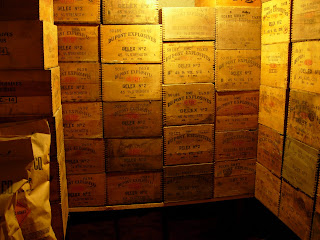



LEAD The town of Lead, pronounced “leed” is famous as the location of the Homestake Mining Company. Why is Lead pronounced “leed”? The name refers to the holes drilled in the face of the mine tunnel to allow dynamite charges to be placed deep behind the face and blow out the rock – in other words, a lead hole.
Why is the company called Homestake? The Homestake mine was the richest single producer of gold in the world delivering 1.25 million kilograms in its lifetime, from the days of the Black Hills gold rush of 1876 until the mine was closed in 2002. Born in Scotland and seeking his fortune in the field of mining, George Hearst (father of William Randolph Hearst) purchased this most promising claim and established the Homestake Mining Company. For Hearst, this was the core of a fortune – the find was not just a “grubstake” mine; it was a “homestake” mine, one that could take care of you for the rest of your life.
DEADWOOD The Mt. Moriah cemetery overlooking the town of Deadwood is best know for its special occupants who dominated the myths of the American West in the last quarter of the 19th century. Buried here are the legendary figures of Wild Bill Hickok and Calamity Jane, whose graves are next to each other, as well as Potato Creek Johnny and other colorful outlaws and marshals who drank and gambled in this gold rush town.
However, less well known is that at the top of these well kept grounds with its resident dead is a Jewish section whose occupants also came to Deadwood after 1875 and lived and died here. They came from Konigsberg, Prussia, from Lithuania, and from towns in Germany --- peddling and setting up shops to provide dry goods, grocery items, and whatever else could be sold to meet the needs of this rapidly growing mining town. In fact, prosperity was more assured to those involved in commercial activities than to those panning for gold. In the American tradition, Jews of this community were full participants -- serving on the town council and in other political and administrative positions. Though they had no synagogue, the Jews formed an observant community that conducted weekly services in the home of one of its members. Their Torah scroll had been brought from the old country, i.e. Europe, where it had been penned in Hebrew by a scribe. As Deadwood went from boom to bust (though never fully busted), the Goldbergs, the Franklins (ne Finkelstein in the old country), the Zoellners, and the others left Deadwood for new opportunities. Their Torah now is in use in a synagogue in Rapid City. These families also pioneered the west and left their marks, possibly not as dramatic as Wild Bill, but certainly as important.
No comments:
Post a Comment